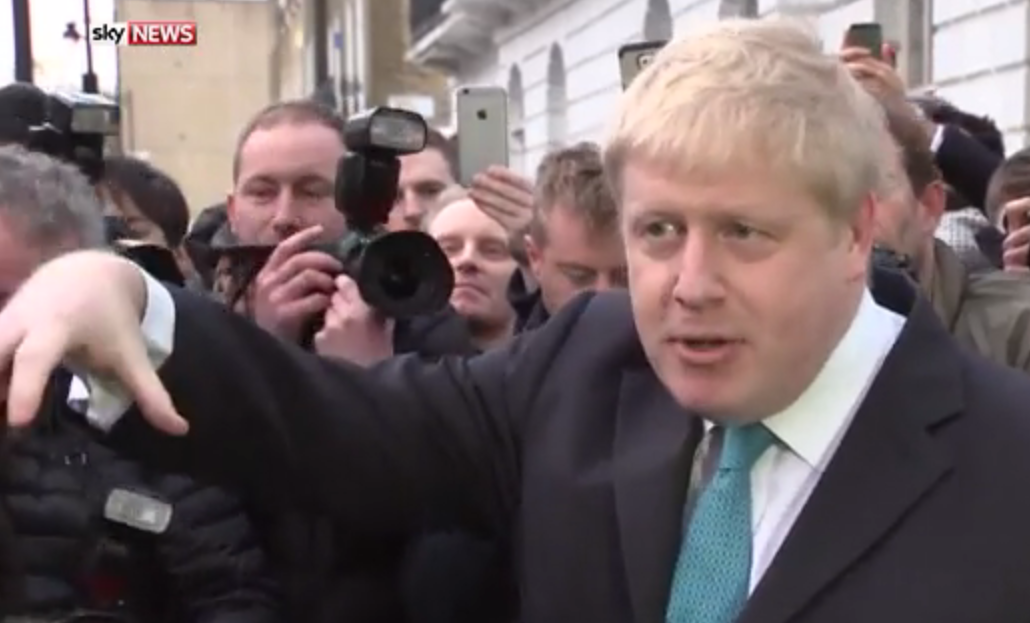Daily catch-up: Boris overcomes his deep internal divisions
The Prime Minister did not expect the Mayor of London to abandon him, nor did he expect his MPs generally to split down the middle. Now he is up against it


Your support helps us to tell the story
From reproductive rights to climate change to Big Tech, The Independent is on the ground when the story is developing. Whether it's investigating the financials of Elon Musk's pro-Trump PAC or producing our latest documentary, 'The A Word', which shines a light on the American women fighting for reproductive rights, we know how important it is to parse out the facts from the messaging.
At such a critical moment in US history, we need reporters on the ground. Your donation allows us to keep sending journalists to speak to both sides of the story.
The Independent is trusted by Americans across the entire political spectrum. And unlike many other quality news outlets, we choose not to lock Americans out of our reporting and analysis with paywalls. We believe quality journalism should be available to everyone, paid for by those who can afford it.
Your support makes all the difference.I feared that I had overdone the "Cameron in trouble" line in my article for The Independent on Sunday, and then came Boris. Now David Cameron is in trouble.
The chances are that he will still win his referendum. You could almost hear the gnashing of teeth from downstairs when the Mail on Sunday received the findings of its latest Survation phone poll, which put Remain on 59 per cent and Leave on 41 per cent (excluding don't knows). A fine example of media herding, the un-prominence given to that result, which cut against the all-consuming Boris-driven story.
But the playing field is tilted more sharply against the Prime Minister than it was three weeks ago. The Conservative Party's respect and gratitude for his winning the election is fading fast. Do they praise him for having delivered the referendum so long sought and yearned for, or do they complain that he has fixed it with smoke, mirrors and the thread of an establishment stitch-up?
Three weeks ago, Cameron thought Boris would come down on the Remain side of the fence, and that perhaps a quarter of Tory MPs would declare for Leave. With the combined Guido Fawkes and Spectator tallies standing at In 138, Out 138, Undeclared 54, it looks as if the Prime Minister will have the majority of his parliamentary party on his side, but only just. Boris Johnson's declaration certainly gives the Outers a chance of mopping up a few of the careerists in the Undeclared column.
I am not convinced that Boris calculated his way to his decision, despite our very good headline this morning: "Boris Out for Himself." There are advantages to seeming the most statesmanlike among the likes of Nigel Farage, George Galloway, Chris Grayling and Iain Duncan Smith, but there are dangers with associating with them too. Nor does it hurt Boris's chances of becoming the next prime minister that the people who will make the final choice, grassroots members of the Tory party, are overwhelmingly anti-EU. But he was likely to win anyway, and this way he will probably not be given a Cabinet post from which to prepare himself.
I think he was "deeply internally divided", as he put it in his article for The Daily Telegraph today, and so in the end decided to go with what he felt was right. We shouldn't dismiss the possibility that politicians at this level hear the summons of history and want to be remembered for doing their best for their country.
Nor should we have been quite so glib about his wife Marina Wheeler's article about the failure of the UK government to curtail the Charter of Fundamental Rights (which Boris in his article calls the Charter of Fundamental Human Rights – as well as, in his ramble outside his front door, saying that the UK joined the Common Market in 1975: detail is not his strong point). Most journalists read Wheeler's article as setting out the Johnson family's demands for the last-minute concessions at the Brussels summit: it would seem it was an indication of a fundamental antipathy to all the EU law "stuff", as Boris put it.
Cameron rose to the challenge of the EU renegotiation, and he will rise to this challenge too. If he loses the referendum, his career will end in failure. If he wins, he has a chance to leave on his own terms, but his own terms will look more like Tony Blair's "own terms", being hustled a little roughly towards the exit, than like Harold Wilson's. What comes after will not be a thousand years of Cameronian sunshine, but a deluge of further banging on about Europe.
Join our commenting forum
Join thought-provoking conversations, follow other Independent readers and see their replies
Comments